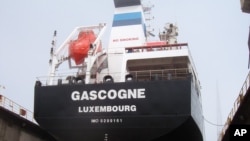LILLESTROEM, NORWAY —
West African heads of state will meet, maybe as soon as this month, to adopt a code to fight growing piracy in their coastal waters that would include use of arrests, prosecutions and seizures of ships, the U.N. shipping agency said.
Piracy is on the increase in the Gulf of Guinea region, which includes Africa's No. 1 oil producer Nigeria and is a significant source of commodities including cocoa for world markets.
In that region, commercial ships do not enjoy the protection of naval security that has dramatically reduced Somali piracy on the other side of Africa.
“Quite soon, probably before the end of this month, heads of states of West African nations will be meeting in Cameroon... to try to adopt a new code of conduct for anti-piracy activities,” Koji Sekimizu, secretary-general of the United Nations International Maritime Organization [IMO], said on Tuesday.
The code of conduct, modeled on one adopted by East African and Arab Peninsula nations in 2009 to fight piracy in the Indian Ocean, would ask governments to arrest and prosecute suspected pirates, seize any vessels believed to have been used in acts of piracy and increase regional cooperation.
The U.N. was seeking to get wealthy countries to fund this work, said Sekimizu, declining to say how much money was required.
“This [piracy in the region] is a recent phenomenon we are very concerned about,” he said on the margins of a shipping conference.
On the other side of Africa, the protection of ships by multinational navy taskforces has dramatically reduced the number of pirate attacks on ships.
It was too early to say whether a similar effort would be needed in the Gulf of Guinea, said Sekimizu.
The latest reported piracy attack off West Africa took place in May, when armed pirates attacked an oil products tanker off the coast of Nigeria and abducted an unknown number of crew, according to security sources.
Piracy is on the increase in the Gulf of Guinea region, which includes Africa's No. 1 oil producer Nigeria and is a significant source of commodities including cocoa for world markets.
In that region, commercial ships do not enjoy the protection of naval security that has dramatically reduced Somali piracy on the other side of Africa.
“Quite soon, probably before the end of this month, heads of states of West African nations will be meeting in Cameroon... to try to adopt a new code of conduct for anti-piracy activities,” Koji Sekimizu, secretary-general of the United Nations International Maritime Organization [IMO], said on Tuesday.
The code of conduct, modeled on one adopted by East African and Arab Peninsula nations in 2009 to fight piracy in the Indian Ocean, would ask governments to arrest and prosecute suspected pirates, seize any vessels believed to have been used in acts of piracy and increase regional cooperation.
The U.N. was seeking to get wealthy countries to fund this work, said Sekimizu, declining to say how much money was required.
“This [piracy in the region] is a recent phenomenon we are very concerned about,” he said on the margins of a shipping conference.
On the other side of Africa, the protection of ships by multinational navy taskforces has dramatically reduced the number of pirate attacks on ships.
It was too early to say whether a similar effort would be needed in the Gulf of Guinea, said Sekimizu.
The latest reported piracy attack off West Africa took place in May, when armed pirates attacked an oil products tanker off the coast of Nigeria and abducted an unknown number of crew, according to security sources.





